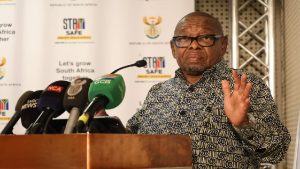Higher Education, Science and Innovation Minister Dr Blade Nzimande says Solar Turtle, an alternative energy project targeted at rural communities and informal traders who are off the electricity grid, is a huge potential game-changer. The system which was launched today is aimed at empowering informal traders and entrepreneurs across Africa, with a particular focus on enabling women and young people to generate an income.
These products came into existence following ten years of research. The energy renewable technology innovations come in various forms, that is the spark case, the spark bike and the spark cart. Co-founder of Baby Turtle James van Der Walt explains these inventions.
“The first kiosk in the range is the spark case. A suitcase-size solo spaza that is easy to transport along for access to local markets such as taxi ranks and schools and informal settlements. The second Baby Turtle in our programme is the spark bike. Similar to the ice cream bike you see at school. The biggest baby turtle in our product range is the spark cart. Designed for high-end traders with the focus on traders that focus on festivals and events. Similar to the other sparks this unit is mobile and offers Wifi, solar charging services and due to its increase in capacity and size these units also offer energy efficiency, freezers and fridge combo as well as gas cooking solution.”
These Solar Turtles addresses a myriad of challenges the country faces. It is a form of job creation and an entrepreneurial system. This is according to Chief Executive Officer (CEO) of Baby Turtle Lungelwa Tyali.
“Goal number one, creating jobs in the grid economy space and therefore poverty is alleviated. Goal number four, provide access to the internet and the charging of ICT devices for online studies. Goal number five, empowering of women and youth. Goal number seven, affordable clean energy in the form of accessibility and pay as you go. Economic growth by the systemic best practise and the entrepreneurial content.”
Minister Nzimande, speaking during a virtual launch, says this solar and hydrogen base source of energy should be accessible to the poor and underprivileged communities in the country.
“The story of Solar Turtle can only serve to strengthen our commitment to an economy and development driven by the twin imperatives of skills development and innovation but this also gives impetus to increased efforts to empower youth as well as pointing to the benefits of the integration of entrepreneurship into the curriculum of university’s engineering and science faculties as well as into the curriculum of TVET colleges.”
Meanwhile, Nzimande says these innovations contribute positively to the economy.
“Our renewable energy programmes are not just producing the next generation of scientists and engineers for the workforce, important as that may be, but these programmes are also producing a generation or new business leaders and entrepreneurs as well as public sector managers and policy experts in the energy field. Such projects are important platforms and in themselves also are examples in strengthening public-private partnerships in this space.”
Nzimande says the Solar Turtles should be accessible to the poor and underprivileged communities in the country.






